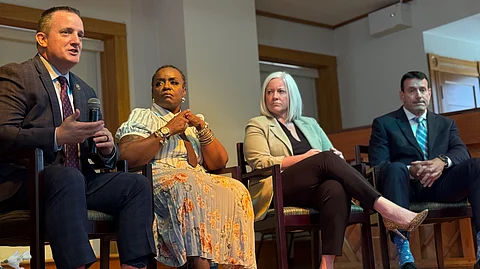
- Home
- Topic Areas
- Newsletter
- Podcast
- 100 Families Initiative
- About
- Connect
- Restore Hope

Community members gathered in the historic Old Main Auditorium at Arkansas Baptist College for the first in a three-part series on violent crime in Pulaski County. Hosted by the 100 Families Initiative, the event brought together public safety leaders to discuss data, challenges, and solutions—including a potential implementation of Group Violence Intervention (GVI), a strategy with national success.
Panelists included Little Rock Police Chief Heath Helton, Pulaski County Prosecutor Will Jones, Assistant Director of the Arkansas Division of Youth Services Kimberly Key-Bell, and Senior Deputy Prosecutor for the 6th Judicial District Casey Mote Beard.
Chief Helton opened with data showing progress. “Overall crime right now year to date is down 18%.” However, he emphasized that numbers alone don’t tell the full story. “Gun violence is truly one of our major Achilles heels in our community,” Helton said. “We’ve got a juvenile issue conundrum in our city. The age demographic with our juveniles between the ages of 13 to 17. That’s where we see the majority of our problems.”
Helton called for a holistic approach to public safety. “Safety is a role for everybody. It’s not just law enforcement. I think we’re on the cusp of doing some really great things in Pulaski County.”
Prosecutor Will Jones reflected on his journey into the justice field and the emotional toll of violent crime. “In a traditional prosecution sense, when the case lands on our desk, it’s too late. Families’ lives have been shattered.”
He described efforts to rebuild relationships with law enforcement and end delays in prosecution. “We literally go to homicide scenes because the number one deterring factor in committing crimes isn’t the sentence—it’s whether you think you’ll get caught.”
Jones mentioned a violence reduction strategy known as Group Violence Intervention (GVI), which was implemented in Pine Bluff, Arkansas, as well as many other high-crime cities around the nation. Pine Bluff went 500+ days without a juvenile homicide. “I think we can do the same thing here in Pulaski County.”
Senior Deputy Prosecutor Casey Mote Beard described the office’s dual strategy. “We always have to prosecute to the fullest extent. However, we are also looking at all the other options to help violence to never have occurred.”
She detailed how GVI works by identifying people at risk of violence and offering both enforcement consequences and real support. “It’s not a program—it’s a strategy. It’s an infrastructure designed to bring everybody together under that one strategy.”
Kimberly Key-Bell brought experience from the front lines of youth services. “I am the person in the agency they see after they’ve been arrested, failed a placement, and come to me.”
She emphasized early intervention, community partnerships, and the reality of returning youth to unsafe environments. “I can’t give the kids the tools they need and then send them back into a dysfunctional home. We have to figure out how we intervene at intake, not after the fact.”
She challenged the audience to rethink punishment. “This system is not designed to be punitive. It’s designed to be oriented toward treatment and rehabilitation.”
Podcast Episodes:
Smart Justice is a magazine, podcast, and continuing news coverage from the nonprofit Restore Hope and covers the pursuit of better outcomes on justice system-related issues, such as child welfare, incarceration, and juvenile justice. Our coverage is solutions-oriented, focusing on the innovative ways in which communities are solving issues and the lessons that have been learned as a result of successes and challenges.
The podcast is available on all major podcasting platforms.
Subscribe to the Smart Justice newsletter.
